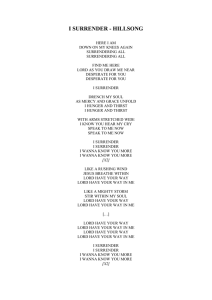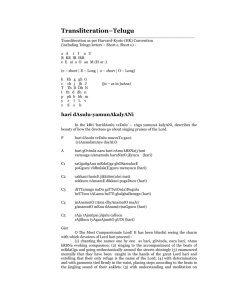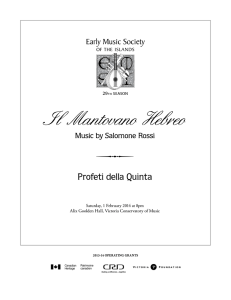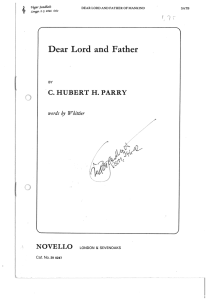Concept of “Seva” in Sikhism
advertisement
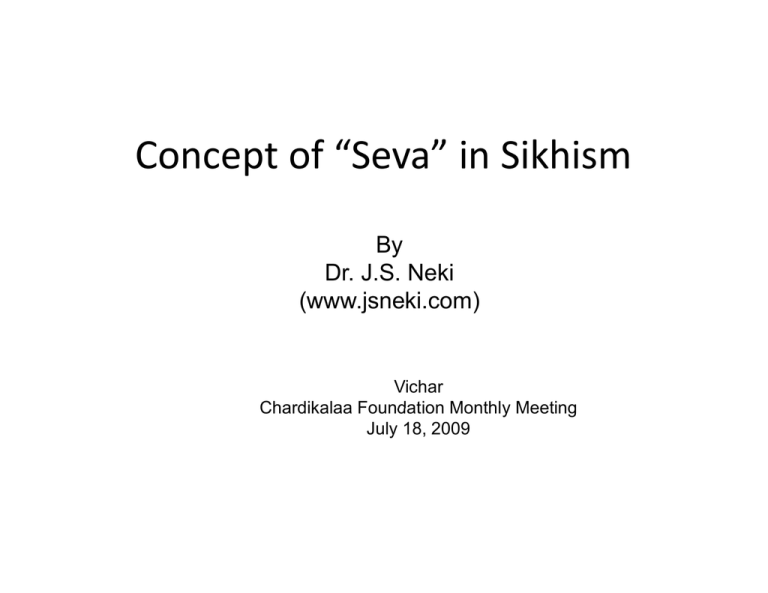
Concept of “Seva” in Sikhism
By
Dr. J.S. Neki
(www.jsneki.com)
Vichar
Chardikalaa Foundation Monthly Meeting
July 18, 2009
Contents
•
•
•
•
•
•
•
Definition of Seva
Definition
of Seva
Seva as per Gurmat
Ch
Characteristics of Seva
i i
fS
Numinous Relations of Seva
Whom To Serve
Types of Seva
Types of Seva
Conclusion
Definition
• Seva versus Service – Service smacks of
• Job done for wages
• Ceremonial functions
C
i l f ti
• Philanthropic assistance or offering
– Seva Reflects
• Labor of love
• Being available
• Twin meaning of Seva from Sanskrit root “sev”
– To serve, wait or attend upon
To serve wait or attend upon
– To honor, revere or worship
• As per Traditional Hindu Society
p
y
– Homoheirarchicus
– Worship reserved for Brahmins. Revered.
– Service (described as menial) reserved for shudras (despised)
“Seva”
Seva as per Gurmat
as per Gurmat
• Both functions (serve and worship) combined
– Worship that does not become work is fake
Worship that does not become work is fake
– Work that does not become worship is in vain
• No worship is conceivable without seva
gur s[sva
va ibnu Bgit n h]heI
eI .
Without serving the Guru, there is no devotional worship,
‐ Prabhati Bibhas m.1 p.1342
• All forms of worship are covered by seva
All forms of worship are covered by seva
pUja Arca s[va b;wn ieh{ ohl m]ih krna .
ibgs{ mnu h]v{ prgasa bhuir n grB{ prna .1.
This is the service which I perform: worship, flower‐offerings, labour of love and devotion.
My mind blossoms forth and is enlightened, and I am not cast into the womb again. ‐ Devgandhari m.5 p.531 Characteristics of Seva
• Seva is work out of dedication, for no reward apart from itself –
s[va krt h]ie inhkamI .
One who performs selfless service, without thought of reward,
One
who performs selfless service without thought of reward
‐ Sukhmami Gauri m.5 p.286
• It is a Divine gift.
He performs His own service and inspires us to do so.
AAapNI
pNI AAaip
ip kr
kr[ prtIit AAap[p sv
s[v GGalIAnu
lIAnu .
He inspires us to place our faith in Him, thus performs His Own Service. ‐ Siri rag m.4 p.90
tum lavhu txu lagh sv
s[v | hm tt[ kCU n h]hvv{ wv
w[v |
If You assign me, I render you service,
By myself, Lord, I cannot do anything. – Gauri Guareri m.5 p.18
Characteristics of Seva (contd)
• It is the highest austerity (Tap)
gur s[va tpa: isir tpu saru .
Service of the Guru_ is the most sublime. ‐
Service
of the Guru is the most sublime Asa m.3 p.423
m 3 p 423
It is the only aproved austerity
sitgur kI s[va iehu tpu prvaNu .
Serving the True Guru is the only acceptable austerity. ‐ Var Ramkali m.3 p.948
• It is not thrust upon you, it has to be begged.
s[va m;g{ s[vk] laeIAa: ApunI s[v .
Your servant begs to serve those who are enjoined to Your service.
‐ Siri rag m.5 p.43
g
p
It has to be faithfully carried out, not grudgingly tolerated.
Characteristics of Seva (contd)
• It is one of the three pillars of spiritual practice
(others being Nam and Simran)
ihku s[vI ihku s;mla hir ieksu pih Arwais .
I serve the One Lord, I contemplate the One Lord, and to the One Lord, I offer my prayer. Also: Nam, Dan, Ishnan and Kirt karna, Nam japna, Vand ke chhakna
‐Var Jaitsari m.5 p.710
Characteristics of Seva (contd)
• It is egalitarian in spirit
It i
lit i i
i it
Everyone is welcome to voluteer; none is barred. Anyone and everyone may be served, because God is in everyone.
hir hir s[[vku s[[va lag{{ sBu w[[K{ bRhm psar[[ .
The servant of the Lord, is committed to His service; He sees God pervading the entire universe. ‐ Nat m.4 p.982
However,,
ijs k{ mstik krmu h]ie s] s[va laga .
One who has good karma inscribed upon his forehead,
He only commits himself to the Lord's service. ‐Var Ramkali m.5 p.964
Yet, millions are there to serve Him:
k]io jna kir s[v lgaieAa jIxu .
You have engaged millions of people in Your Service
You have engaged millions of people in Your Service. ‐ Gauri Majh m.5 p.216
Gauri Majh m 5 p 216
But who serves and who is served?
Aap[ Oakuuru Aap[ s[vkuu Aaip bnav{ BatI .
He Himself is the Master, and He Himself is the servant;
He Himself creates the variety (of Creation). – Dhanasri m.4 p.668
Characteristics of Seva (contd)
• It establishes dignity of labour.
It establishes dignity of labour
Unlike the Hindu system, one who serves is considered honourable
Aawru iwta parbRhim guru s[sivAa
ivAa st Baie jIxu .4.
The Supreme Lord confers honor and respect on those who serve the Guru with true love. – Suhi m.5 p.760
Not just serving the Guru_, serving even the 'lowest' of men:
jn nanku its k[ crn pKal{ j] hir jnu nIcu jait s[vkaNu .4.4.
Servant Nanak washes the feet of that humble servant of God; who serves even the low caste people. ‐Gond m.4 p.861. In fact, the Lord confers robe of honour
,
on one who serves, blends him with Himself, and dignifies him ,
,
g
in the world.
pihir isrpaxu s[vk jn m[l[ nank pRgo phar[ .2.29.93.
He dressed me in robes of honor, and blended His servant with Himself; N ki
Nanak is revealed in glory throughout the world –Sorath
l di l
th
h t th
ld
S th m.5 p.631. 5 631
Those who serve not only are great themselves, they redeem others as well.
sitguru s[vih s[ mha purK s;sar[ . Aaip xuWr[ kul sgl instar[ .
Those who serve the True Guru are the greatest people of the world.
Those
who serve the True Guru are the greatest people of the world
They save themselves, and they redeem all their generations as well
‐Gauri Guareri m.3 p.161
Characteristics of Seva (contd)
• Eradication of Haumai
d
f
is essential for Seva_
lf
sitgur kI s[va s] kr[ ijsu ibns{ hxum{ tapu .
One can serve the True Guru only when the fever of egotism has been eradicated. ‐ Sri rag m.5 p.45
Sri rag m 5 p 45
So too is required eradiction of pride and arrogance man AiBman m;W[ s] s[vku nahI .
One who is influenced by pride and conceit is not God'ss servant. One who is influenced by pride and conceit is not God
servant
‐ Sri rag m.5p.51
Characteristics of Seva (contd)
• It has a collective more than an individual profile
Organization ofsan_gat and pan_gat.
saWs;git k{ Gir vs{ e[k] sca s]ie .1.
In the Company of the Holy, the One True Lord abides ‐ Srirag m.5 p.44.
m 5 p 44
•
Seva versus Dan
Seva is the ideal, dan is the means
Seva becomes collective, dan
becomes collective dan by and large remains individual
by and large remains individual
Dan is centered on the need of others, seva irrespective of it. l;gru cl
lgru
cl{ gur sbiw hir tio
t]io n AavI KoIA
KoIA{ .
The Langar runs on the Guru's word and its supplies never run short.
‐Var Ramkali Balvand & Satta p.967
Numinous Relations of Seva
Relation with Naam
• Through Seva Naam comes to dwell in the miind
e[ha s[sva
eha
va cakrI namu vs{
vs min Aaie .
By this work and service, the Naam shall come to dwell within the mind.
‐Sri rag m.3 p.34
gur sva
s[va tt[ hir namu paieAa ibnu sitgur kie
k]ie n paviNAa .1.
Serving the Guru, the Lord's Name is obtained. Without the True Guru, no one can receive it. ‐Majh m.3 p.116
• Nam aids seva by eradicating haumai
mukt[ s[v[ mukta h]v{ . hxum{ mmta sbw[ K]v{ .
Aniwnu hir jIxu sca svI
s[vI pUr{ Baig guru paviNAa |
Serving the Master of Liberation, liberation is achieved.
The Shabd eradicates egotism and possessiveness. So serve the True Lord,
night and day. By perfect good luck, the Guru is found. ‐Majh m.3 p.116
Numinous Relations of Seva (contd)
Relation with Shabd
• Through seva one gets shaped by Shabd
gurmuiK sv
s[va GGail
il ijin GGalI
lI .
itsu GzIA{ sbwu scI oksalI ||
Whoever, as Gurmukh, serves and works hard,
Whoever
as Gurmukh serves and works hard
is shaped in the true mint of the Shabd. ‐ Bhairo m.4 p.1134
• Seva comes by reflecting on Shabd
s[va surit sbiw vIcair . jpu tpu s;jmu hxum{ mair .
jIvn muktu ja sbwu suNae[ . scI rht sca suKu pae[ .7.
Selfless service and intuitive awareness come by reflecting upon the Shabd.
Chanting the Nam, intensive meditation and austere self‐discipline come by subduing the ego.
One becomes Jivan‐mukta by listening to the Shabd.
Living a truthful way of life, one finds true peace. || 7 ||
‐ Prabhati m.1 p.1343
Numinous Relations of Seva (contd)
Relation with Hukam
kaio islk pRiB s[va laieAa . hukmu saihb ka s[vk min BaieAa .
s]eI km
seI
kmav{v jj] ssaihb
ihb BBav{v svku
s[vku AA;ttir
ir bbahir
hir mmahru
hru jIxu .2.
God has cut the noose from around my neck and placed
God
has cut the noose from around my neck and placed
me in His Service. The Master's Command is pleasing to His servant's mind. He does that which pleases his Master. Inwardly and outwardly the servant knows his Lord
and outwardly, the servant knows his Lord.
‐ Majh m.5 p.101
Whom To Serve
• Only the Lord God
hir tuWu baJhu m{ k]eI nahI .hir tuW{ s[vI t{ tuWu salahI .
Other than You, Lord, nothing is mine. I serve You, Lord, and I praise You. Other
than You, Lord, nothing is mine. I serve You, Lord, and I praise You.
‐Majh m.3 p.112
sca s[vih scu kmavih sc] scu kmaviNAa |
They serve the True One, practice Truth; and earn only Truth.
‐ Majh m.3 p.116
• The Guru_
iksu hxu svI
s[vI ikA
ikAa jpu krI stgur pUCxu jjaie
ie .
stgur ka BaNa m;in leI ivchu Aapu gvaie .
Whom shall I serve? What shall I chant? I will go and ask the Guru.
I will accept the Will of the True Guru and eradicate my 'self'
I will accept the Will of the True Guru, and eradicate my self from within.
from within
‐ Sri rag m.3 p.34
gur t[ sacI s[va h]ie .
Through the Guru true service is performed
Through the Guru, true service is performed. ‐ Gauri m.3 p.158
Whom To Serve (contd)
itsu gur kxu sw bilharN{ ijin hir s[va bNt bNaeI .
I am forever a sacrifice to that Guru, who has led me to serve the Lord.
‐Var Vadhan_s m.4 p.588
hxu sitguru s[vI AapNa iek min iek icit Baie .
I serve my True Guru with single‐minded devotion, and lovingly focus my consciousness on Him. –Sri rag m.3 p.26
stgur kI s[va gaKzI isru wIj{ Aapu gvaie .
It is very difficult to serve the True Guru.
for you have tourrender your head; give up your 'self''. – Sri rag m.3 p.27
stgur kI s[va Ait suKalI j] ieC[ s] Plu pae[ .
Serving the True Guru brings great comfort,
and whatever one desires is fulfilled. – Sri rag m.3 p.31
• Harjan – God's servant
hir jn kI s[va j] kr[ iet xUUtih CUUo{ .
Whoever serves the humble servants of the Lord, is emancipated here and hereafter. – Bilaval m.5 p.811
Types of Seva
Aink Ba:it kir s[va krIA{ .jIxu pRan Wnu Aag{ WrIA{ .
panI pKa krxu tij AiBmanu .Aink bar jaeIA{ kurbanu .
Serve Him in many different ways;
Serve
Him in many different ways;
Dedicate your soul, your breath of life and your wealth to Him.
Carry water for Him, and wave the fan over Him ‐ renounce your ego.
Time and again, be a sacrifice unto Him. – Asa m.5 p.391 mnu tnu ArpI s[v krIj{ .
Dedicates your mind and body to servethe Lord. ‐Gauri guareri m.5 p.181
n[tR punIt Be[ wrsu p[K[ hst punIt ohlava |
irwa punIt irw{ hir bisX mst punIt s;t WUrava .1.
The eyes are sanctified, gazing upon the Lord,
Serving Him, the hands are sanctified.
The heart is sanctified, when the Lord abides within it; The forehead Saints is sanctified which touches the dust of the feet of the
The forehead Saints is sanctified which touches the dust of the feet of the. ‐Sarang m.5 p.1212
Types of Seva‐2
Tan di seva_ ‐ serving with one's body
sa kaieAa j] sitguru s[v{ sc{ Aaip svarI .
That body, which serves the Guru, the True Lord has decorated Himself.
– Suhi m.4 p.754
paNI pKa pIsxu s[vk k{ Oakur hI ka Aahru jIxu .1.
I carry the water, wave the fan, and grind the grain for the servant of my Lord. ‐Majh n.5 p.101
Looking after the sick, cripples, handicapped with love and sympathy.
Serving the guests.
g]ib;w kI ohl sPl ieh ka:ieAa .
Working for the Lord, the body becomes fruitful. – Gauri m.5 p.2o1
Types of Seva (contd)
Man di seva – serving through the mind
pRRB k[ s[vk bhuutu Ait nIk[ min srWa kir hir War[ .
God's servants are most exalted; they enshrine faith for Him in their minds. ‐ Nat m.4 p.982
gur kI s[va ivsrI ikxu mnu rh{ hjUir .
One who forgets to serve the Guru; how can his mind remain in the Lord's Presence?
‐ Var Bilaval m.3 p.854
Contributing through one's learning, art, manarerial
b
h
h
' l
l skills.
k ll
Bringing about reforms – economic, political, social, religious.
without involving the ego
h
l
h
Types of Seva (contd)
Dhan di seva_ ‐ philanthropic service
Fulfilling needs of the needy.
qrIb wa mU;h guru_ wI glk ` rht nama BaeI cxupa is;G
Mouth of the poor is the Guru's charity‐box
Tithe, offerings before Guru Granth Sahib, Shabd Bhet
m[r[ rramm k]k Bd
mr
B;daruru . KKatt Kric kCu t]tio
io n Aav{
A v AA;ttuu nhI hir paravaru
p r v ru .
This is the treasure of my Lord.
Consuming and expending it, it is never used up. O Lord, it has no end or limitation. Ramkali m.5. p.893
Types of Seva (contd)
Surt di seva_ ‐ serving through inner awareness
s[[va surit
i sbiw
i vIcair
I i .jpu tpu s;;jmu hxuxm{ mair
i .
jIvn muktu ja sbwu suNae[ .scI rht sca suKu pae[ .7.
Labor of love through intuitive awareness comes by reflecting upon the Shabd. Ch i i
Chanting, intensive meditation and austere self‐discipline come by subduing the ego.
i
di i
d
lf di i li
b
bd i
h
One becomes liberated while yet alive, by listening to the Shabd.
Living in a truthful way, one finds true peace. – Prabhati m.1 p.1343
s[va surit ek
sv
e[k ilv llaie
ie .
Serve the One Lord, with loving awareness. This is the highest type of seva.
‐Gauri Guareri m.1 p.222
gurmuiK r]rim
im r]rim
im hir iWAav{
iWA v .
The Gurmukh meditates on the Lord with every hair of his body.
‐ Sidh GostRamkali m.1 p.941
His virtues would echo from every atom of the world and dissipate ecstasy.
His virtues would echo from every atom of the world and dissipate ecstasy.
Q & A
